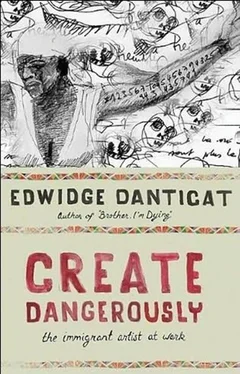I don’t know why it seems always to surprise some Americans that many of their fellow citizens are vulnerable to horrors that routinely plague much of the world’s population. After all, we do share a planet whose climate is gradually being altered by unbalanced exploration and dismal environmental policies that may one day render us all, first world and third world residents alike, helpless in the face of more disasters like Tropical Storm Jeanne and Hurricane Katrina. Let us also not forget the ever-looming menace of 9/11-like terrorism, which can potentially have the same effect, landing thousands on street corners and in Astrodomes asking themselves how they came to be there.
The poor and displaced are indeed sometimes better off in places far from their impoverished homes. But in the end, must poverty also force us to live deprived of homestead, birthplace, history, memory? In the case of Hurricane Katrina, was it really a flood that washed away that nuanced privilege of deciding where one should build one’s life, or was this right slowly being stripped away while we were already too horrified to watch?
One of the advantages of being an immigrant is that two very different countries are forced to merge within you. The language you were born speaking and the one you will probably die speaking have no choice but to find a common place in your brain and regularly merge there. So too with catastrophes and disasters, which inevitably force you to rethink facile allegiances.
Shortly after the terrorist attacks of September 11, 2001, Masood Farivar, a former Afghan mujahideen who received part of his education in a madrassa in Pakistan, wrote, “As an Afghan, I’d never carried the black, red, and green flag of my own country. Suddenly though, I wanted to feel what it was like to proudly hold a flag, wave it at passing ambulances, police cars, and fire trucks. It would be a good way to show my solidarity with Americans. It was my way of saying, we’re in this together. I’m with you. I share your pain.”
“I come from the so-called Third World,” wrote the Chilean novelist and memoirist Isabel Allende after September 11, 2001, a day that also marked the twenty-eighth anniversary of a U.S.-sponsored coup d’état against her uncle, Salvador Allende. Still, she writes,
Until only a short time ago, if someone had asked me where I’m from, I would have answered, without much thought, Nowhere; or, Latin America; or, maybe, In my heart I’m Chilean. Today, however, I say I’m an American, not simply because that’s what my passport verifies, or because that word includes all of America from north to south, or because my husband, my son, my grandchildren, most of my friends, my books, and my home are in northern California; but because a terrorist attack destroyed the twin towers of the World Trade Center, and starting with that instant, many things have changed. We can’t be neutral in moments of crisis I no longer feel that… I am an alien in the United States.
After the horrible carnage of September 11th, hadn’t the world echoed Farivar’s and Allende’s sentiments and also declared, through many headlines in newspapers across the globe, that we were all Americans?
At least for a while.
Among the many realities brought to light by Hurricane Katrina was that never again could we justifiably deny the existence of this country within a country, that other America, which America’s immigrants and the rest of the world may know much more intimately than many Americans do, the America that is always on the brink of humanitarian and ecological disaster. No, it is not Haiti or Mozambique or Bangladesh, but it might as well be.
Flying Home
I used to have a fear of flying. No, I was never the hyperventilating kind of airline passenger, or the person who wouldn’t even get in the air at all. But each time I was set to board an airplane, I would stay up the night before, putting my life in order, arranging important papers, cleaning my apartment. In case “the worst” ever did happen, I told myself, I wouldn’t want my loved ones to have to sort through my dirty laundry-literal and otherwise-to wash my soiled dishes and pick up my cluttered piles of books off the floor. Besides, my sleepless nights always gifted me with what seemed like a shorter trip, since I would fall asleep soon after buckling my seatbelt and wouldn’t wake up again until I reached my destination.
This strategy worked fine for a while, until I had to travel regularly on book-related trips. My travels then increased in frequency from my four or five yearly journeys to Haiti to stretches of two to three weeks when I would be on a different airplane once, and sometimes twice, a day.
How to make those long flights bearable? I certainly couldn’t stay up every night if I were to be in half-decent shape for my book-related event the next day. So I decided to approach my plane rides in an entirely different manner; I was not going to dread them, but welcome them, value them as pockets of life experiences that couldn’t take place anywhere else. I would fully embrace the “magic” of being suspended in midair, between hard ground and sky, simply like a bird, or like the jailbird Daedalus who, with his son Icarus, had crafted wings of wax and feathers to escape their earthly prisons.
I began my effort at improving my flight experiences by reading purposefully during my flights. My airplane reading would often be centered on themes. On some flights I would read only newspapers and magazines, catching up on one particular event. On other flights I would read a short novel, and finishing the entire book during the flight would give me a great thrill, as if I’d just flown a cross-Atlantic mission with Amelia Earhart.
When not reading books, I would read people, some of whom march onto planes with their life stories literally on their sleeves: a honeymooning couple sharing a heart-wrenching good-bye before being separated by a few short rows, an unaccompanied minor sobbing while ending a custodial visit with one parent to return to the other. This would make me think of Assotto Saint, a Haitian American poet and performance artist, who pegged as one of the defining moments in his life the hours he spent in the skies as a fourteen-year-old boy about to be reunited with a mother he hadn’t seen for almost a decade. Of that particular plane ride, he would later write, “i wanted to write a happy carefree poem / for my childhood / lost too fast… / somewhere in the air / between port-au-prince & new york city / but I’m left bereft.”
I too am left bereft when random acts of kindness manifest themselves in airplane aisles. Once on a flight from Port-au-Prince to Miami, a muscular white man with an elaborately tattooed arm willingly surrendered his aisle seat for a tighter middle seat so that a nervous Haitian father could sit next to his young daughter. Another time, an old woman who had trouble walking to her seat after the airline wheelchair had delivered her to the plane door was taken in the arms of a younger man and carried gently to her spot.
Once on an early morning flight from San Francisco to Miami, a woman sitting two rows behind me suffered a heart attack. I was dozing off with the shutters pulled down and a blanket over my head when a voice came over the loudspeaker asking if there was a physician onboard. It turned out there were a few, among them an affable man with salt-and-pepper hair, who immediately took control of the situation, operating an EKG machine and defibrillator from the plane’s advanced first-aid kit while calmly probing the woman’s distressed husband and teenage son for details of her medical history.
During the moments it took for the doctor to decide whether or not we should land so the woman could be rushed to the nearest hospital in the nearest city, her name and age and overall condition were shouted down the aisle from the doctor to the flight attendant, who was in touch with the pilot by phone.
Читать дальше












